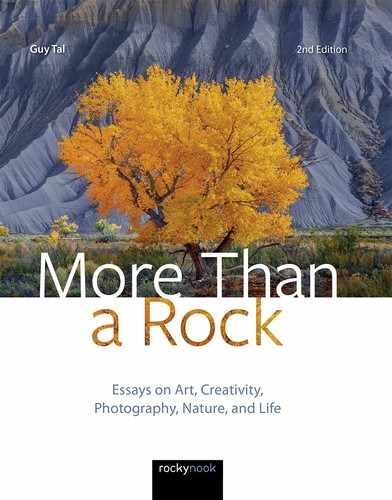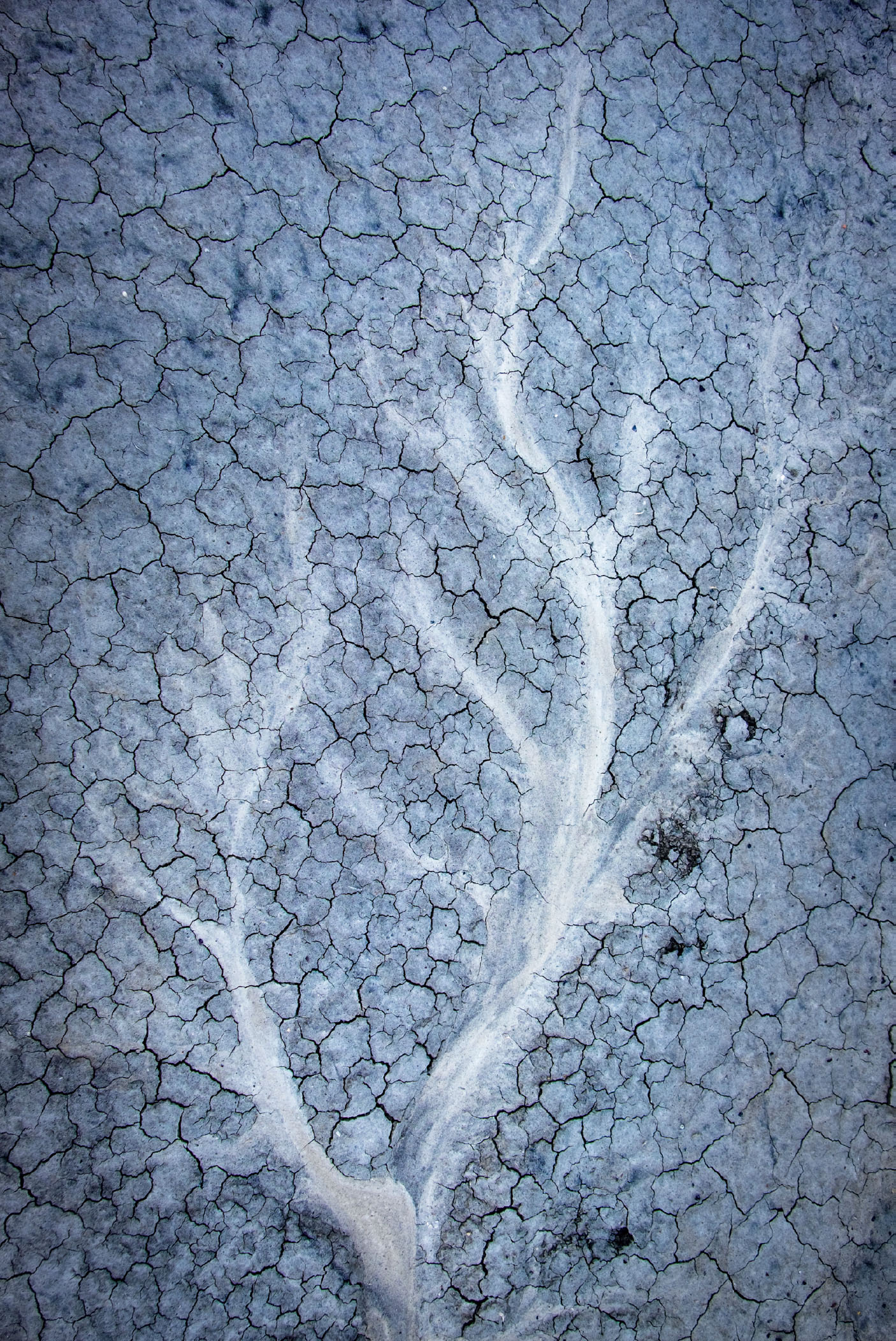55A Matter of Perspective
When you’re in the desert, you look into infinity. It’s no wonder that nearly all the great founders of religion came out of the desert. It makes you feel terribly small, and also in a strange way, quite big.
—David Lean
It’s a chilly autumn morning in the desert. I am still in my sleeping bag, leaning against a large rock and sipping hot coffee as I savor the first of the sunlight, looking out into the canyon through the sheltering arc of a large alcove that has been my home for the last couple of days. The air is still. Not even a single leaf on the old cottonwoods below me is so much as trembling. The soft gurgle of water in the creek reverberating off the stone walls and the hushed chirping of a small flock of juncos scattered among the shrubs in the clearing before me are the only sounds I hear.
The only evidence I can see of the existence of other humans are odd figures carved into the rock wall behind me, created by long-gone Neolithic cultures. But no person has lived for any considerable period within fifty miles of here for at least a couple hundred years. I doubt that more than a handful of people visit this canyon on any given year. Although I can’t know this for sure, I take some pride in the not-unlikely possibility that I may know this canyon better, and have spent more time in it, than perhaps any other living human. Although I have found a couple of ancient dwellings within about a mile of this site, I suspect that this alcove, despite its generous size (or perhaps because of it), was a social or ceremonial site rather than a place of habitation. Despite the many petroglyphs in the rocks around me, there is no evidence of food preparation or tool making here: no charring on the ceiling, no metates (mortars), no midden, no rock flakes, no potsherds. Other than the occasional rude whooshing of a jetliner high above, I have not seen or heard any other hint of the existence of other living people for three days so far, and I expect the trend to continue.
Although I generally try to dismiss such thoughts when I become conscious of them, I still take a moment to reflect on the human world I left behind. Here in the canyon, I can’t even tune into a radio station, let alone access the internet. Somewhere in the human world, momentous events are doubtlessly unfolding as I write: cultures shift and change; wars are fought, lost or won (depending on whom you ask); relationships form and crumble; technologies are developed and retired; fortunes are made and lost; lives begin and end, some just waste away in rush-hour traffic, in social media banter, in offices and city streets, or in other manufactured realities. “Oh well,” I think. And that’s as much thought as I’m willing to give it at this time. Certainly, some of these things are eminently important to some people, and some may have important consequences for me, too, in some future time. But there’s nothing I can do about them—or want to do about them—here. Even if aliens have invaded and overtaken civilization while I slept, I wouldn’t know about it for a few more days.
The most important thing to me at this time is to savor this experience: to make myself conscious of as much as my senses can feed into my brain, to “process” recent events in my life and my new reality, and perhaps to find some meaning in it—in my being here, in the life, the light, and the geology surrounding me, in the illness that may not prevail today but that has already made its intentions known. Even photography will have to wait. There is a lot to photograph here, to be sure, but I’m not ready for it just yet. Millie the dog has climbed onto my sleeping bag, flipped on her back, and needs her belly rubbed. And we both need some breakfast.
———
Perspective is a point of reference: a relationship in space or time, or some other dimension, between some “here” and some “there.” As a photographer, choosing my perspective allows me to control visual relationships in my compositions. In the words of Ansel Adams, “A good photograph is knowing where to stand.” By moving myself, I can make things seem closer together or farther apart; I can make some things appear larger or smaller than other things; I can bring desirable things into my composition and exclude distracting ones; I can juxtapose some things against other things. In a larger sense, perspective is also the metaphorical relationship between me and the world. Much like I can guide a viewer’s attention in a photographic composition by controlling my literal position, I can also guide my own attention by controlling my metaphorical position. In consciously choosing my position, I can make some thoughts and feelings seem more or less important than others; I can enlarge some useful ideas and diminish or eliminate distracting ones; I can align or contrast some perceptions with others to affect their meanings or to arrive at entirely new meanings.
Without effort, I can think of a dozen things to be concerned about, to feel anxious about, to make me want to rush out to where there is cellular signal so I can get myself up to speed on what’s “going on.” But why in the world would I want to do that? Right here, right now, beauty, peace, and gratitude abound, but only if I am open to them, only if I am willing to set aside less profitable thoughts, and only if I can muster the discipline to maintain a mindful perspective: fully aware of and grateful for this rare and ephemeral experience. “A man who dares to waste one hour of time,” wrote Charles Darwin, “has not discovered the value of life.” But an hour seems too long. In an hour, the light would be different, the birds may be gone, the wind may pick up, and while unlikely, even another person might show up. How can I defend wasting so much as a second of this on unproductive thoughts, on things I can do nothing about?
For me, the calmest and most rewarding of all perspectives is that in which by objective analysis (rather than by myth, superstition, wishful thinking, denial, or delusion), I am entirely insignificant. I am awed by the perspective of deep time and of the immensity of the universe in which I am little more than a coordinate harboring some arrangement of atoms and molecules that by some yet-unknown means has the capacity for a subjective, if perhaps illusory, sensation of consciousness and agency. It’s only in narrowing this scope, in treating some arbitrary portion of the world as if it’s all there is, or as if it possesses some universal and timeless importance, that anxiety and discontent arise and peace is disrupted.
My diminishing moments of conscious living, inconsequential as they are in the grand scheme, are all I will ever get to experience. To use them in the most appropriate way I can is as high a purpose as a mortal being may aspire to, and as such they must inform every choice I make, every path I choose, every story I make myself a part of. There is no mystery about the purpose of life. The purpose of life is to be lived to the greatest and deepest extent that one can before it is lost beyond recall, as is the fate of all things; and my experience right here, right now, is the only thing that constitutes living.

